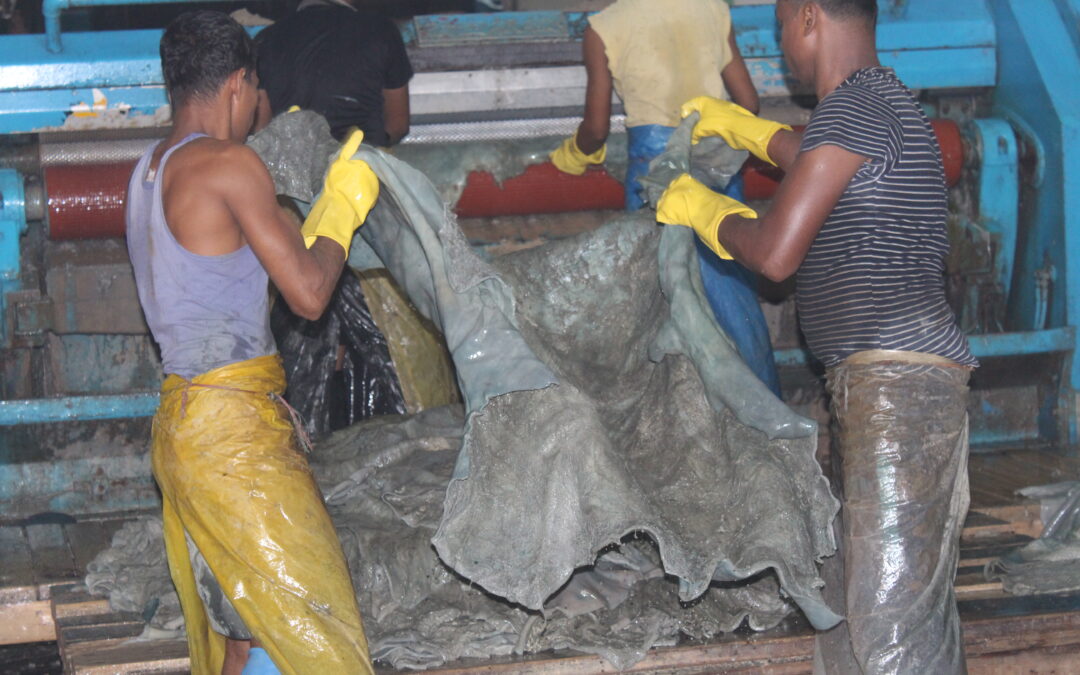Marking this year’s Earth Day, the Solidarity Center is launching a new video about Bangladesh tannery workers’ campaign for safer, healthier and greener jobs. Available in English and Bangla, the video provides a window into one of the country’s most dangerous jobs and demonstrates how the tannery sector sits at the intersection of the worker rights and environmental justice movements.
Bangladesh’s leather sector, which satisfies one-tenth of world demand and whose exports of leather and leather goods totaled $1.1 billion in 2022, profits from a model that relies on low wages, lax workplace safety and unchecked environmental degradation. Its processes involve a stew of dangerous chemicals and heavy metals. Left untreated or flushed into waterways or surrounding areas, as happened in Hazaribagh, Dhaka, for decades, these substances pollute the environment, sicken workers and the local population, contaminate the air and water sources, and make food production dangerous. In Savar Tannery Industrial Estate in Hemayetpur—to which the government in 2017 ordered approximately 25,000 tannery workers and their families to move amid increasing international pressure regarding Hazaribagh’s toxic environmental and working conditions—factory sludge and effluents are not being effectively treated and new environmental threats are being created.
Meanwhile Bangladesh is one of the most acutely climate-impacted countries, with cyclones, flooding and extreme heat increasingly common. Around the world and in Bangladesh, climate change hits the poorest and most marginalized communities hardest. Worsening climate change, combined with environmental degradation in the workplace and surrounding communities, have compounding impacts on workers and their families.
A recent Solidarity Center survey of tannery workers living in Hemayetpur illustrates how the impact of industrial pollution, harsh working conditions and low wages is leaving workers, their families and their communities increasingly vulnerable to serious health issues and more frequent climate-related shocks in the country.
Workers said they have suffered exposure to fire or electric shock, falling, cutting, broken bones, heavy objects falling on them, contact with acid or chemicals, and inhalation of chemical fumes or gas. Health issues diminish workers’ earnings—which workers said were insufficient for covering basic needs. At the same time, costs have skyrocketed, including for transportation, which is made more challenging when regular waterlogging and flooding make roads impassable.
Local communities have reported that they are afraid or unable to grow food or catch fish, and note that just breathing the polluted air is enough to ruin their appetite. Poor water quality, meanwhile, adds to the burden of women’s care work, and more women than men mentioned now having to spend more time collecting water and doing so from greater distances.
“We used to cook with the water of [the] river. I used to bathe in the river. But we cannot do anything with the river water now,” a woman community member affected by the Savar Tannery Industrial Estate told the Solidarity Center last year.
With Workers, Toward a Safer, Greener, More Fair Industry
Because workers best understand the hazards and solutions to improving their jobs—and how they and their families are most disproportionately impacted by the health consequences of environmental degradation—workers are demanding inclusion in industry decision-making and wage-setting processes.
The Solidarity Center partners in Bangladesh with the Tannery Workers Union (TWU) representing those who—like others in Bangladesh and around the world—are suffering geographic displacement and other climate change consequences, as well as environmental degradation at work and in their communities.

